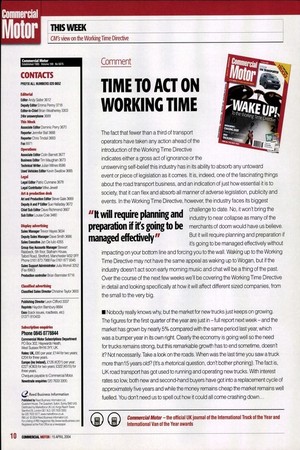TIME TO ACT ON WORKING TIME
Page 10

If you've noticed an error in this article please click here to report it so we can fix it.
The fact that fewer than a third of transport operators have taken any action ahead of the introduction of the Working Time Directive indicates either a gross act of ignorance or the unswerving self-belief this industry has in its ability to absorb any untoward event or piece of legislation as it comes. It is, indeed, one of the fascinating things about the road transport business, and an indication of just how essential it is to society, that it can flex and absorb all manner of adverse legislation, publicity and events. In the Working Time Directive, however, the industry faces its biggest challenge to date. No, it won't bring the industry to near collapse as many of the merchants of doom would have us believe. But it will require planning and preparation if it's going to be managed effectively without
impacting on your bottom line and forcing you to the wall. Waking up to the Working Time Directive may not have the same appeal as waking up to Wogan, but if the industry doesn't act soon early morning music and chat will be a thing of the past. Over the course of the next few weeks we'll be covering the Working Time Directive in detail and looking specifically at how it will affect different sized companies, from the small to the very big.
• Nobody really knows why, but the market for new trucks just keeps on growing. The figures for the first quarter of the year are just in -full report next week and the market has grown by nearly 5% compared with the same period last year, which was a bumper year in its own right. Clearly the economy is going well so the need for trucks remains strong, but this remarkable growth has to end sometime, doesn't it? Not necessarily. Take a look on the roads. When was the last time you saw a truck more than15 years old? (It's a rhetorical question, don't bother phoning). The fact is, UK road transport has got used to running and operating new trucks. With interest rates so low, both new and second-hand buyers have got into a replacement cycle of approximately five years and while the money remains cheap the market remains well fuelled. You don't need us to spell out how it could all come crashing down...
























































































































































































